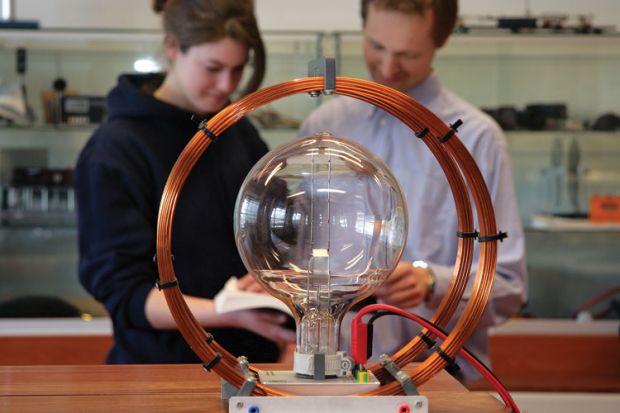Source: Alamy
Popular: TV shows and experiments at Cern have increased interest in physics
A decade ago, physics was in the doldrums: student numbers had stagnated over the previous 10 years and in December 2004, Newcastle University closed its pure physics course to new undergraduates simply because not enough students were applying.
But from 2015 the university will reopen the course to new entrants amid a wider resurgence of interest in physics nationally.
Nick Wright, Newcastle’s pro vice-chancellor for research, said that the hugely popular television programmes presented by University of Manchester physicist Brian Cox had boosted interest in the subject among young people.
“We all owe Brian Cox a beer,” he said.
Publicity surrounding experiments at the Switzerland-based Cern research facility had also had an impact, he added.
In 2004-05, there were 14,610 students studying physics in the UK, according to Higher Education Statistics Agency data.
Numbers stagnated until 2007-08 (shortly before the first beams were successfully fired around Cern’s Large Hadron Collider), since when they have grown by 22 per cent to 18,120 in 2011-12.
Newcastle will accept up to 80 students a year on the course, Professor Wright said. “I doubt that we’ll actually get 80 [in the first year],” he cautioned, but added that he had been “taken aback” at the level of interest at a recent open day.
He explained that the relaunch had “not been too difficult” because Newcastle had continued to conduct physics research and run a natural sciences course while the pure physics course had been closed.
An extra five to 10 staff would be recruited as part of the reintroduction, he said, and “millions” would be spent refurbishing rooms.
Professor Wright said that he was not certain whether physics teaching would require cross-subsidisation from other subjects to make it financially viable, although he added that at Newcastle each school was “breaking even at worst”.
Register to continue
Why register?
- Registration is free and only takes a moment
- Once registered, you can read 3 articles a month
- Sign up for our newsletter
Subscribe
Or subscribe for unlimited access to:
- Unlimited access to news, views, insights & reviews
- Digital editions
- Digital access to THE’s university and college rankings analysis
Already registered or a current subscriber? Login





